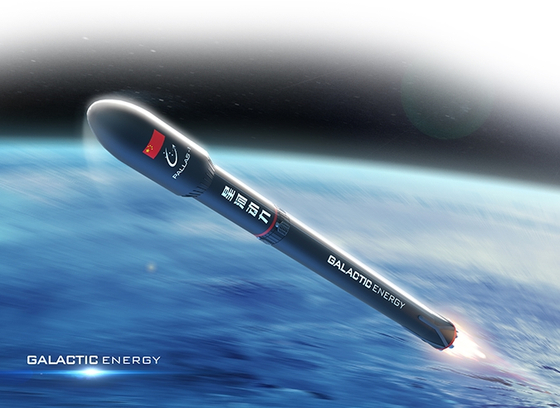“5, 4, 3, 2, 1”
Second successful rocket launch among Chinese private companies
It’s still a long way to catch up with Space X
At the end of the countdown, a black rocket soars into the sky. It is Gu Seonxing No. 1 developed by Xinghe Dongli, a Chinese private rocket company, Galatic Energy.
![[사진 36kr]](https://i0.wp.com/pds.joins.com/news/component/htmlphoto_mmdata/202102/09/801c8721-47f9-4924-8bf1-a9988f02ce47.jpg?w=560&ssl=1)
[사진 36kr]
November 7, 2020 15:12 Gansu Juquan Satellite Launch Center. On this day, Goo Seon Singh 1 successfully entered the scheduled orbit and completed the launch successfully. The development team, waiting for their breath at the launch center on the ground, shed tears of emotion upon hearing the news of the success.
In 2014, when China allowed private companies to develop and launch rockets, the civil aerospace industry sprang up and about 10 private rocket companies were created. However, not many companies have survived just by trying. The only company that successfully launched a rocket before Xing He Dong-ri was Xing Ji Long Yao (星际荣耀 Interstellar Glory Space Technology), and the rest of the companies unfortunately all ended in failure.
In other words, it means that Xinghe Dongli was the second successful rocket launch among Chinese private companies. In addition, it was the first Chinese private enterprise to enter the solar synchronous orbit at an altitude of 500 km.
![Founder Ryu Baiqi [사진 gongkong.ofweek]](https://i0.wp.com/pds.joins.com/news/component/htmlphoto_mmdata/202102/09/b16c6357-52c0-4494-802c-776813a05407.jpg?w=560&ssl=1)
Founder Ryu Baiqi [사진 gongkong.ofweek]
Xinghe Dongli is a new startup that has been established for only three years. In February 2018, it was a rather late start-up among private rocket companies. Founder and CEO Liu Baiqi is from the China Rocket Research Institute (中国火箭技术研究院). After permission to develop a private company rocket, many proposals were received. He, too, had thoughts about starting a business, but did not immediately put it into action. This is because it has not been able to draw conclusions about the company’s development model.
In fact, rocket development is a field that has high entry barriers, requires a lot of funds, has high risks, and has to go through a difficult process to recover the investment. Space X, a global representative private rocket company founded in 2002, also succeeded in launching for the first time in 2010, even though it received support from NASA.
![[사진 36kr]](https://i0.wp.com/pds.joins.com/news/component/htmlphoto_mmdata/202102/09/b11ca564-3168-401a-9185-def56477506b.jpg?w=560&ssl=1)
[사진 36kr]
For this reason, Ryu Baichi conducted market research before establishing the company, and went through the process of clarifying the form of the company to be created and the direction to pursue. Based on the results, a company focused on small satellite rockets was created. Small rockets are characterized by their relatively low cost and a somewhat mature stage of technology.
Both of Xingheodongli’s key products are small rockets. It is largely divided into a small solid-carrying rocket launch service’Gu Seon Xing series’ and a medium-sized repeatable liquid-carrying rocket launch service’Z Seon Xing series’.
Founder Ryu Baichi describes these products as’bus’ and’taxi’, respectively. The liquid rocket’Zsunshing’ is like a’bus’ that can carry multiple satellites at once because of its excellent carrying capacity. The solid rocket’Guseonsing’ has relatively low carrying capacity, but its smaller size allows faster launch. It corresponds to a’taxi’ that runs straight away when called.
![[사진 36kr]](https://i0.wp.com/pds.joins.com/news/component/htmlphoto_mmdata/202102/09/13c27982-9a02-478c-9bc8-a895cb99104f.jpg?w=560&ssl=1)
[사진 36kr]
Xingheodongli thinks that if these two rockets are used in harmony, they will be able to meet the various demands of the aerospace market in the future.
To save money, Xing Heo Dong-li worked on research and development of rocket engines. The engine accounts for more than 50% of the cost of developing a rocket. Ryu Baiqi puts its own development capability as one of its strengths. According to the introduction, 70% of the 100 employees of Xinghe Dong-ri are engineers who worked in the aerospace front line.
![[사진 36kr]](https://i0.wp.com/pds.joins.com/news/component/htmlphoto_mmdata/202102/09/86a75d7c-7d24-435a-bb05-ad84f2cb2c94.jpg?w=560&ssl=1)
[사진 36kr]
As a private rocket company, Xinghe Dongli is also one of the companies called’China’s Space X’. In this regard, Xinghe Dong-li co-founder Sha Dong-kun said, “There is still a long way to go if a private aerospace company such as SpaceX is to be created in China.”
He said, “If the Chinese privately held commercial aerospace industry continues to grow stably, we will be able to achieve positive results within 3-5 years.” “Space X has already gone through 18 years, and now Chinese companies are Even if it develops, it will take 18 years.”
China Lab Sung-Hyun Hong
![[사진 차이나랩]](https://i0.wp.com/pds.joins.com/news/component/htmlphoto_mmdata/202102/09/bd09b9bc-4248-4381-a34b-18a1d0f7b3db.jpg?w=560&ssl=1)
[사진 차이나랩]
